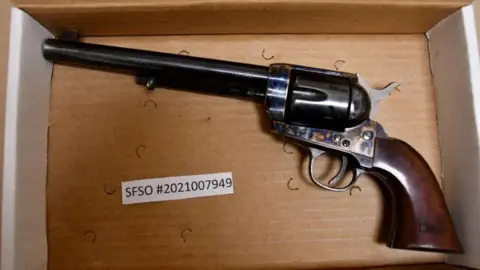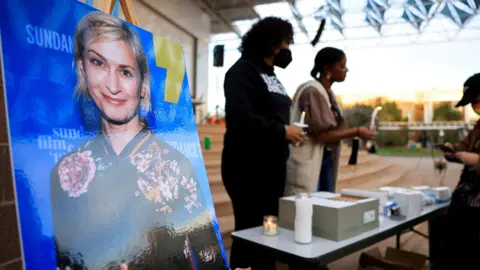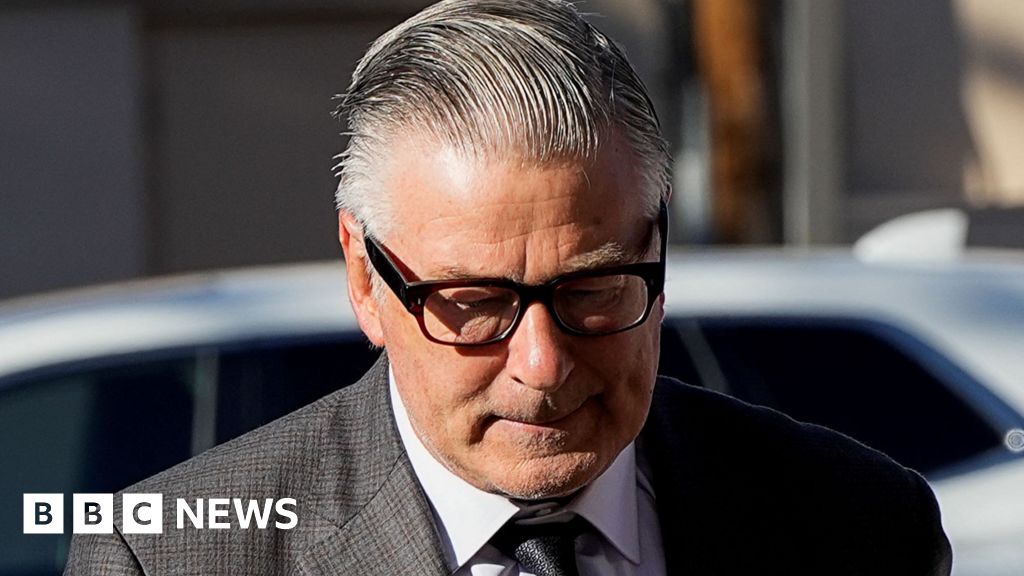By Emma Vardy, Samantha Granville and Christal Hayes, BBC News
Actor Alec Baldwin arrived at a New Mexico courthouse Tuesday for the start of his trial in a fatal shooting on the set of the Western film Rust.
Mr Baldwin, 66, faces involuntary manslaughter charges, which he denies. The trial will determine whether he should be held criminally liable in the October 2021 death of cinematographer Halyna Hutchins.
The 42-year-old was killed after a gun Mr Baldwin was using in a scene rehearsal went off. A bullet from the gun fatally struck the cinematographer and wounded director Joel Souza.
Jury selection began Tuesday morning with prosecutors and Mr Baldwin’s attorneys questioning potential jurors about everything from their political affiliation to their knowledge of the case.
A panel of 12 jurors and four alternates is needed before opening statements, which are scheduled to begin on Wednesday.
Mr Baldwin – best known for playing Jack Donaghy on the NBC sitcom 30 Rock and for portraying Donald Trump on sketch show Saturday Night Live – was joined in court by family including his wife, Hilaria. He has pleaded not guilty to the felony charge.
He maintains that he did not pull the trigger, and says the gun went off when he cocked the revolver’s hammer. His defence team argues that it was the responsibility of other crew members to ensure the gun was safe.
But prosecutors have called this claim “absurd”, alleging that the actor did not share this information when first interviewed after the shooting and arguing he had a responsibility to follow basic gun safety.
What happened on the Rust set?
In October 2021, Mr Baldwin, was rehearsing on the Rust set near Santa Fe, New Mexico. He was practising a cross-body draw of the gun, as the director called for him to point it at the camera in an upcoming scene.
Mr Baldwin – who boasts a 40-year acting career – had a starring role in the film, which he was also co-producing. He was portraying an outlaw whose 13-year-old grandson is convicted of manslaughter.
As he pointed the revolver during the rehearsal, it went off. A bullet from the weapon hit Ms Hutchins in the chest, also striking director Joel Souza in the shoulder.
Ms Hutchins was flown to hospital by helicopter but died of her injuries. Mr Souza was taken by ambulance from the scene at Bonanza Creek Ranch.
Court documents show that Mr Baldwin and others on set did not know the gun was loaded or that it contained live ammunition.
It was discovered later that the film’s armourer, Hannah Gutierrez-Reed, brought a box of live bullets to the film set from her California home. Prosecutors said those live rounds slowly spread through the set over the course of 12 days.
Gutierrez-Reed, who loaded the gun for Mr Baldwin before the shooting, was charged and found guilty of involuntary manslaughter in Ms Hutchins’ death. She was sentenced to 18 months in prison – the maximum sentence.
Judge Mary Sommers, who oversaw the case, said Gutierrez-Reed’s mistake had cost Ms Hutchins her life by turning “a safe weapon into a lethal weapon”.
David Halls, an assistant director and safety coordinator, has also pleaded guilty to unsafe handling of a firearm.
What are the claims in the case?
One of the key questions in the case is this: did Mr Baldwin pull the trigger or did the gun malfunction?
Several weeks after the fatal shooting, Mr Baldwin told ABC News in a high-profile interview that he did not pull the trigger.
Legal experts say this has forced the actor into a much narrower defence, as he cannot allege that he did not remember what occurred or that it happened by accident.
Prosecutors, meanwhile, have painted Mr Baldwin as an unsafe firearm handler, showing footage of him waving around weapons on set and saying in filings that he was unable to control his emotions.
They also cited an FBI report that tested Mr Baldwin’s claim. It found that the gun’s “trigger had to be pulled or depressed sufficiently to release the fully cocked or retracted hammer”.
During the analysis of the weapon in 2022, an FBI examiner took a mallet to the weapon and broke its internal components.
Mr Baldwin’s lawyers have called this “outrageous” and argued the destroyed weapon deprived the defence of a full opportunity to examine the gun in its original condition.
But a judge denied a last-ditch effort to dismiss the involuntary manslaughter charge.
 Reuters
ReutersWhat to expect during the trial
Tre Lovell, a trial lawyer in California, says prosecutors will argue that even though Mr Baldwin was on a film set, it does not alleviate him from basic gun-handling skills and safety duties.
They will argue that anybody who holds a gun, whether on a film set or in real life, has an obligation to never point it at someone and to ensure it is not loaded with live rounds.
Prosecutors attempted to argue during a pre-trial hearing that Mr Baldwin had greater safety responsibilities on set as a producer, but Judge Sommer sided with the defence and said this was irrelevant to the case.
That means Mr Baldwin’s role as producer – a credit given for raising money, creative input, or physical production work – will not be included in the trial.
But his defence team still has much work ahead to win its case, Mr Lovell says, as it will need to help the jury understand a film set – a space in which people have designated roles and obligations.
“They need to show the jury that once you start imposing a duty on an actor to ensure that a prop is safe, set will go into chaos,” he said.
“There’s no evidence that he [Baldwin] would have even known the difference between the dummy bullet and a real bullet.”
Mr Baldwin’s legal team will also likely argue that the actor should have been able to rely on the film’s armourer and safety coordinator – Gutierrez-Reed and Halls, respectively – to ensure he could perform his job without worry.
Will Baldwin testify?
Mr Baldwin is not currently scheduled to testify at the trial, but that does not mean it will not happen.
Most legal experts agree there are very few reasons to have a defendant testify at any trial because it allows prosecutors the chance to cross-examine them.
Mr Baldwin’s defence team can wait until toward the end of the trial to make a decision based on how the proceedings have gone.
The trial is scheduled to last 10 days.
Gutierrez-Reed did not testify during her own trial.
Could Baldwin see prison time?
 Reuters
ReutersMr Baldwin faces up to 18 months in prison due to the charges related to Ms Hutchins’ death.
Gutierrez-Reed, who faced the same charge in the fatal shooting, received the maximum sentence.
But even if the jury finds Mr Baldwin not guilty, his legal troubles will not be over.
He faces several civil lawsuits, including one brought by Ms Hutchins’s family.
In a negligence legal action, they claim the cinematographer’s death and other injuries and fatalities were “a likely result” on a movie set that contained guns, live ammunition and the actor “inexplicably” pointing and firing a gun at Ms Hutchins.
Mr Baldwin has said in recent court filings that he has struggled to find acting work since the incident.
In May, the actor and his wife Hilaria announced that they and their seven children would star in a reality show next year.



